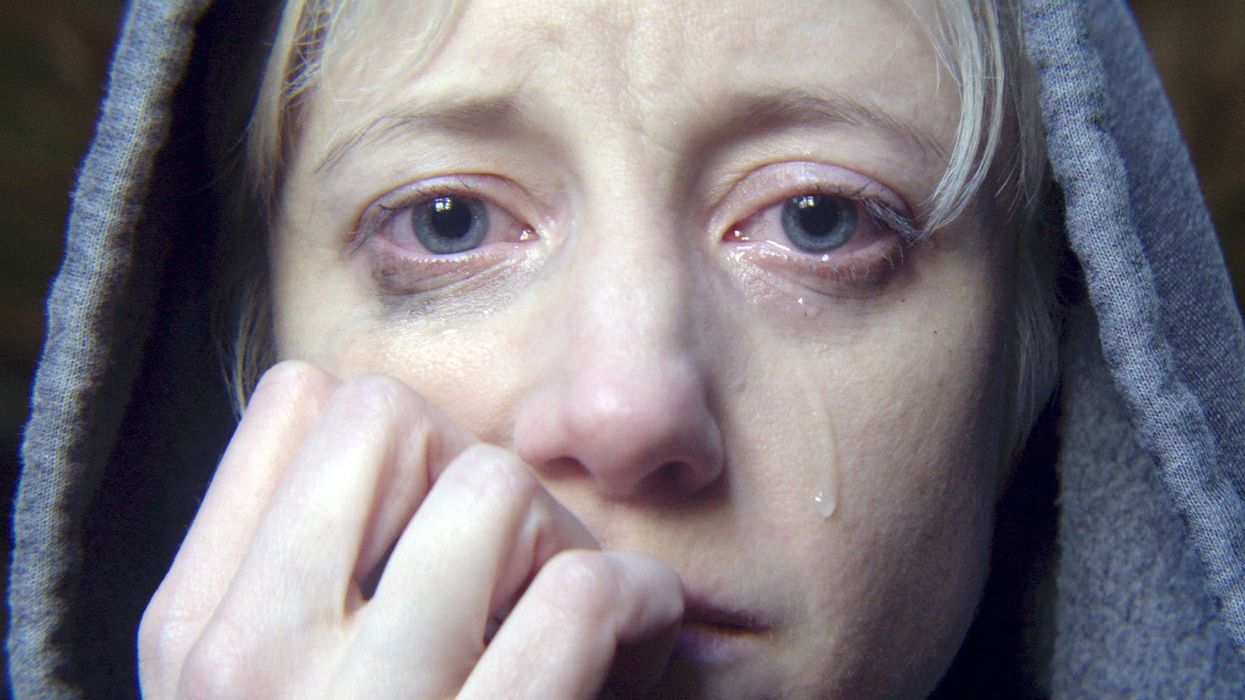Can't Get Enough 'Black Mirror'? Watch These Dystopian Sci-Fi Shorts
These nine shorts will tide you over until the fifth season of Black Mirror drops.

Black Mirror is not only a window into a dystopian future but also its mirror. Charlie Brooker's show is haunting precisely because it addresses ethical quandaries we already increasingly face. Dehumanization technology that makes fighting wars more palatable figured largely in "Men Against Fire," but don't we already have drone warfare? As for the individualistic, social media-obsessed world of "Nosedive"...need we say more?
Below, we've compiled nine sci-fi short films that present disturbing visions of a future in which various notions of "progress" have superseded our most human of experiences.
Harvest
Although it may seem staged, this is a documentary—only it's narrated by an iPhone. Kevin Byrnes's Harvest follows a woman named Kim around as she conducts an ordinary suburban existence. But to thousands of strangers whom she has never met, the details of Kim's life are anything but mundane. After watching this, you might think twice about enabling "Location Services."
Dream Girl
A fusion of Black Mirror's "San Junipero," and Spike Jonze's Her, Lauren Cohan's sensuous short film features a microchip that, if worn while sleeping, induces a virtual reality universe in which couples can meet and date. But are the people who fall in love in "Dream Reality" compatible in real life? Dream Girl features excellent performances from Alexander Dispersia, playing a lonely and heartbroken architect, and Margaret Qualley, who plays his "dream girl" inside the simulation. (Frustratingly, only Part 1 of the film is available now, but it's worth watching as a standalone piece).
In The Gap
Swedish filmmaker Albin Glasell's sci-fi short has Black Mirror written all over it: A woman, finding herself trapped in a strange server room, begins to panic, until a disembodied voice seeming to arise from the network of computers tells her to "make your choice according to the protocol." Like many episodes of Black Mirror—most notably, "Black Museum," and "White Christmas"—this short film is concerned with the consequences of uploading a copy of a person's consciousness to a machine. When the machine finally tells the woman that she "wrote the protocol," we gather that, like Jon Hamm's character's clients in "White Christmas," the original version of this woman has consented to the upload. But does that make it ethical?
The Disappearance of Willie Bingham
Another hallmark theme of Black Mirror is vigilante justice. It figures into the end of "Black Museum" and is the central theme of "White Bear," in which a woman who is convicted of a crime is sentenced to undergo daily psychological torture conjuring the horrors of eternal return. Matt Richards's film The Disappearance of Willie Bingham depicts a world in which "eye for an eye" justice, or the law of retaliation, has been reinstated. An inmate is selected to undergo a gruesome punishment introduced under the State’s revised stance on capital crime.
Strange Beasts
Imagine an augmented reality version of Neopets, and you've got Strange Beasts, the titular technology that takes center stage in Magali Barbé's ultimately disturbing short. In what appears to be an introductory pitch video, the product's founder and CEO states that the “nano-retina technology” projects digital streams into your eye, allowing for a kind of “supervision” which integrates custom-design imaginary beasts into your life. But, as is the pertinent ethical dilemma with everything AR, how far is too far? And will advanced technology serve to further alienate us from our humanity? "Men Against Fire" and "Playtest" also deal with this quandary—albeit with bloodier conclusions.
Hyper-Reality
Here's another futuristic vision of augmented reality, but it's concerned with a different question: What if AR is dystopian capitalism's secret weapon? In Keiichi Matsuda's short film, individualism and capitalism have reached their apex, thanks to the advent of new technology that integrates game systems, self-help gurus, and advertising into a live virtual universe that overlays the physical world. Much like in "Nosedive," Hyper-Reality presents a future in which each human life is essentially a component of a worldwide virtual game, in which players can level-up with "victory points" they earn by completing various challenges. The film's anxiety-inducing visuals of landscapes oversaturated with media, advertising, and social media are frighteningly familiar.
Never Happened
If you cheat on your wife on a business trip but use the app "Wipr" to erase the memory, it never happened, right? Like a combination of the memory recall tool in "The Entire History of You" and the "block" mechanism in "White Christmas," Mark Slutsky's film deals with the moral implications of memory erasure.
Sight
In the same vein as Hyper-Reality, Sight is set in a world in which augmented reality dominates the human experience. "Game junkies," as they're colloquially called, navigate life through a series of apps, such as games encouraging players to perfectly cut a cucumber while cooking or successfully identify constellations in the sky. There are also much less innocuous games involving human interplay: the protagonist of Sight decides to play while on a first date, which recognizes his date's face, reads her emotions, and prompts him to ask questions or alter his actions accordingly. But in the end, Sight isn't simply a cautionary tale about technological progress; it implicates the nefarious human behavior and unmitigated power that such progress enables.
Strays
Throughout history, most wars have been fought between tribes, nations, or religions. But what if children waged war against adults? That's the premise of Aaron Dunleavy's haunting short Strays. In less than four minutes, Dunleavy manages to create a dystopian universe in which children have ruthlessly annihilated their elders. What could possibly go wrong?
Which of these nine short films is your favorite? Which most effectively captures the creepy, dystopian aura of Black Mirror? Let us know in the comments below.
















